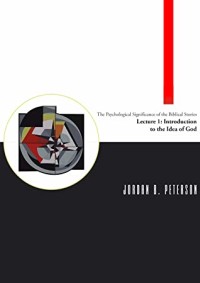
The Psychological Significance Of The Biblical Stories: Genesis
تأليف : Jordan B. Peterson
النوعية : علم النفس
نعتذر، هذا الكتاب غير متاح حاليًا للتحميل أو القراءة لأن المؤلف أو الناشر لا يسمح بذلك في الوقت الحالي.
حفظ
The Bible is a series of books written, edited and assembled over thousands of years. It contains the most influential stories of mankind. Knowledge of those stories is essential to a deep understanding of Western culture,
which is in turn vital to proper psychological health (as human beings are cultural animals) and societal stability. These stories are neither history, as we commonly conceive it, nor empirical science. Instead, they are investigations into the structure of Being itself and calls to action within that Being. They have deep psychological significance. This lecture series, starting with the very first book, will constitute an analysis of that significance.
15-Part Lecture series by Dr. Jordan B. Peterson
1. Introduction to the Idea of God
2. Genesis: Chaos and Order
3. God and the Hierarchy of Authority
4. Adam and Eve – Self-Consciousness, Evil and Death
5. Cain and Abel – The Hostile Brothers
6. The Psychology of the Flood
7. Walking with God: Noah and the Flood
8. The Phenomenology of the Divine
9. The Call to Abraham
10. Abraham: Father of Nations
11. Sodom and Gomorrah
12. The Great Sacrifice
13. Jacob’s Ladder: Pt. 1
14. Jacob’s Ladder: Pt. 2
15. Joseph and the Coat of Many Colors
The Bible is a series of books written, edited and assembled over thousands of years. It contains the most influential stories of mankind. Knowledge of those stories is essential to a deep understanding of Western culture,
which is in turn vital to proper psychological health (as human beings are cultural animals) and societal stability. These stories are neither history, as we commonly conceive it, nor empirical science. Instead, they are investigations into the structure of Being itself and calls to action within that Being. They have deep psychological significance. This lecture series, starting with the very first book, will constitute an analysis of that significance.
15-Part Lecture series by Dr. Jordan B. Peterson
1. Introduction to the Idea of God
2. Genesis: Chaos and Order
3. God and the Hierarchy of Authority
4. Adam and Eve – Self-Consciousness, Evil and Death
5. Cain and Abel – The Hostile Brothers
6. The Psychology of the Flood
7. Walking with God: Noah and the Flood
8. The Phenomenology of the Divine
9. The Call to Abraham
10. Abraham: Father of Nations
11. Sodom and Gomorrah
12. The Great Sacrifice
13. Jacob’s Ladder: Pt. 1
14. Jacob’s Ladder: Pt. 2
15. Joseph and the Coat of Many Colors
المزيد...



